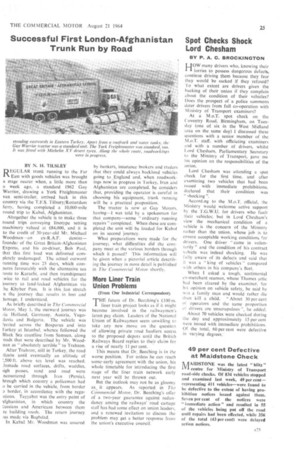Spot Checks Shock Lord Chesham
Page 29

If you've noticed an error in this article please click here to report it so we can fix it.
BY P. A. O. BROOKINGTON
HOW many drivers who, knowing their lorries to possess dangerous defects, continue driving them because they fear they would be sacked if they refused? lo what extent are drivers given the backing of their union if they complain about the condition of their vehicles? Does the prospect of a police summons deter drivers from full co-operation with Ministry c>f Transport examiners?
At a M.o.T. spot check on the Coventry Road, Birmingham, on Tuesday (one of six in the West Midland area on the same day) I discussed these questions with a senior member of the M.o.T. staff, with officiating examiners and with a number of drivers, whilst Lord Chesham, Parliamentary Secretary lo the Ministry of Transport, gave me his opinion on the responsibilities of the union.
Lord Chesham was attending a spot check for the first time, and after examining two vehicles that had been issued with immediate prohibitions, declared that their condition was " shocking ".
Accord,ng to the M.o.T. official, 1 he Ministry would welcome active support by the T.G.W.U. for drivers who fault their vehicles; but in Lord Chesham's view •the mechanical condition of a vehicle is the concern of the Ministry rather than the union, whose job is to ensure acceptable working conditions for drivers. One 'driver "came in voluntarily" and the condition of his contract vohicle was indeed shocking. He was fully aware of its defects and said that it was a " king of vehicles " compared ,xith others in his company's fleet.
When I asked a tough, sentimental ex-merchant seaman, whose Thames artic had been cleared by the examiner, for his opinion on vehicle safety, he said he was a family man and would rather die than kill a child "About 30 per cent o operators and the same proportion of drivers are unscrupulous ", he added.
About 70 vehicles were checked during the day and approximately 15 per cent were issued with immediate prohibitions. Of the total, 60 per cent were defective in varying degrees,






















































































































